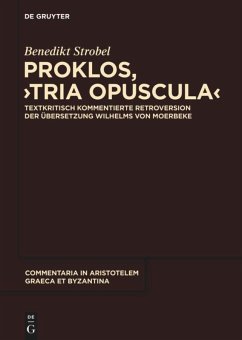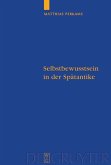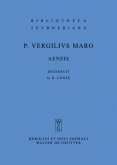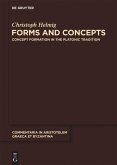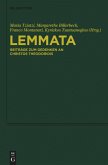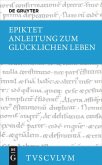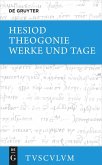The Tria Opuscula by the Late Antique Neoplatonist Proklos are accessible in full in the translation into medieval Latin by Wilhelm von Moerbeke, as well as in fragments in the Greek texts of Late Antique and Byzantine authors. Using the form of a commentary on passages, this work assesses what we can learn from these sources about the original Greek text of the three works. At the same time the commentary serves the elucidation of the first complete Greek retroversion of the Tria Opuscula, which is published here.
Proklos' "Tria Opuscula" - seine drei philosophiegeschichtlich einflussreichen Abhandlungen "De decem dubitationibus circa providentiam", "De providentia et fato et eo quod in nobis" und "De malorum subsistentia" - sind vollständig in der mittelalterlichen lateinischen Übersetzung Wilhelms von Moerbeke sowie fragmentarisch in griechischen Texten spätantiker und byzantinischer Autoren greifbar. Wilhelm zielt in seiner Übersetzung darauf, seine griechische Vorlage so exakt wie möglich wiederzugeben, und wählt dafür ein artifizielles Latein, dessen Sinn sich an vielen Stellen nur dann erschließt, wenn, v.a. mit Blick auf Wilhelms Übersetzungsmethode und Proklos' philosophischen Sprachgebrauch, untersucht wird, wie erstens der von Wilhelm übersetzte und wie zweitens der Originaltext der Werke zu rekonstruieren ist. Diese Untersuchung wird in Form eines Stellenkommentars geleistet; er dient zugleich der Erläuterung der hier publizierten ersten vollständigen griechischen Retroversion der "Tria Opuscula", die aus der genannten Untersuchung hervorgegangen ist.
Proklos' "Tria Opuscula" - seine drei philosophiegeschichtlich einflussreichen Abhandlungen "De decem dubitationibus circa providentiam", "De providentia et fato et eo quod in nobis" und "De malorum subsistentia" - sind vollständig in der mittelalterlichen lateinischen Übersetzung Wilhelms von Moerbeke sowie fragmentarisch in griechischen Texten spätantiker und byzantinischer Autoren greifbar. Wilhelm zielt in seiner Übersetzung darauf, seine griechische Vorlage so exakt wie möglich wiederzugeben, und wählt dafür ein artifizielles Latein, dessen Sinn sich an vielen Stellen nur dann erschließt, wenn, v.a. mit Blick auf Wilhelms Übersetzungsmethode und Proklos' philosophischen Sprachgebrauch, untersucht wird, wie erstens der von Wilhelm übersetzte und wie zweitens der Originaltext der Werke zu rekonstruieren ist. Diese Untersuchung wird in Form eines Stellenkommentars geleistet; er dient zugleich der Erläuterung der hier publizierten ersten vollständigen griechischen Retroversion der "Tria Opuscula", die aus der genannten Untersuchung hervorgegangen ist.

